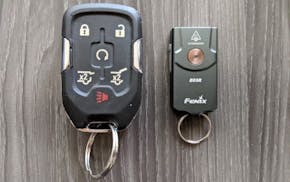Q: Why do some car manufacturers build cars requiring premium fuel? With the price difference between premium and regular, aren't they putting themselves at a disadvantage? I am determined that my next car will run on regular and I'd guess that many others feel the same way.
A: You might be overreacting a bit. Carmakers who build models requiring premium also build models that call for regular, so I don't see any disadvantage. The simple answer as to why is this: Higher octane fuel allows higher-compression engines that produce more power.
A good example of this is our 2010 turbocharged Passat that requires premium fuel. The same vehicle with the non-turbo engine calls for regular octane fuel. The fact that there are many premium fuel models sold annually confirms that "many others feel the same way" — pay your money and take your choice.
Q: We have a 2003 Ford Excursion 7.3 Diesel that we absolutely love except for one thing. Sometimes when you start the car, the radio dash lights do not come on, which means the radio isn't working along with that no a/c, no power windows and no garage door opener. Then everything magically starts working again some minutes later. It can be a real pain, particularly if you need to operate one of those items and just never know when it will work again. Any ideas of what might be causing this?
A: The most likely culprit is a worn ignition switch. When you turn the key to the "on" position, the switch may not be fully closing the contacts or the lock cylinder may not be rotating the switch far enough to electrically connect the power accessories you've listed. Have you tried wiggling the key in the "on" position once the truck has been started? Fortunately, the switch itself can be electrically tested to confirm whether it's the problem. A new switch is under $35 and only takes about 30 minutes to install.
Q: Three dash warning lights stay lit while driving my 2002 Buick Regal. When the car is first started the "Trac Off", "Service Engine Soon" and "Anti-Lock" warning lights go out after the initial start-up test like they are supposed to, but as soon as I shift out of park all three warning lights come on and stay on until I turn the car off. And, no, I haven't had the codes read yet. Any ideas?
A: Your question to me is premature. Scanning the computer for DTC fault codes is the first step. Without specific codes pointing to the precise source of the problem or problems, all I can tell you is that both the Traction Control and ABS are disabled. Since the TCS can be switched on/off, the problem is more likely in the ABS. A relatively simple cause is outlined in GM service bulletin 03-05-25-008 dated October 2003 pointing to the possibility that the harness for the front wheel speed sensors could potentially wear through from contact with a front tie-rod. A more serious and expensive issue would be a problem with the EBCM (Electronic Brake Control Module).
Q: What would cause the edge of a piston to burn away on 2003 8.1-Litre Mercruiser motor? It then pumped all oil out of the dipstick tube.
A: A burned-away edge of a piston is a classic sign of too-high operating temperatures in that cylinder. Is this the only cylinder damaged? Or are there signs of the same issue in other cylinders? Check the spark plugs for whitish or burned electrodes, which might confirm a carburetor or ignition problem — too little fuel and/or too much spark advance.
But remember, water circulation through the engine and cooling jackets is critical. If something restricted water pick-up in the lower unit or the water pump impeller failed, the engine would overheat very quickly.
Once the piston edge burned away, cylinder compression pressurized the crankcase, forcing oil out of the dipstick tube.

Motormouth: Oil type not an issue



